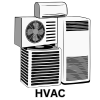A Combustion chamber is an important component of an Internal combustion engine. It plays a vital role in engine performance and its knock properties.

In this article:
Types of combustion chamber:
The combustion chamber is classified based on fuel type and injection method.
- For Spark Ignition (SI) Engines
- For Compression Ignition (CI) Engines
- Special Types (Used in Gas or Dual-Fuel Engines)
Also Read: What type of combustion chambers are used n gas turbine engines?
Lets discuss in detail:
1. For Spark Ignition (SI) Engines:
(Common in petrol/gasoline engines)
A. Hemispherical Combustion Chamber (Hemi Head)

Dome-shaped chamber allowing large valves and a central spark plug. Known for high power and efficient combustion.
- Shape: Half-sphere dome
- Features:
- High volumetric efficiency
- Large valves can be accommodated
- Centrally located spark plug ensures good flame travel
- Advantages:
- Excellent power output and efficiency
- Reduces knocking
- Disadvantages:
- Complex and expensive cylinder head
- Higher surface area leads to more heat loss
B. Pentroof Combustion Chamber

Sloped roof-like design with four valves. Promotes better air-fuel mixing and is common in modern engines.
- Shape: Roof-like structure with inclined valves (resembles a house roof)
- Features:
- Allows 4-valve-per-cylinder configuration
- Compact and efficient
- Advantages:
- Promotes swirl and better air-fuel mixing
- More efficient combustion
- Used in: Most modern high-performance engines
C. Wedge Combustion Chamber

- Shape: Wedge-like chamber with one flat surface
- Features:
- Simple design
- Helps in squish and swirl motion
- Advantages:
- Cost-effective and compact
- Disadvantages:
- Less efficient flame propagation compared to hemispherical
D. Bowl-in-Piston Type

- Shape: Recess (bowl) in the piston crown
- Features:
- Used in engines with high compression ratios
- Advantage:
- Improves turbulence and mixing
- Common in: Some performance and race engines
2. For Compression Ignition (CI) Engines:
(Common in diesel engines)
A. Direct Injection (DI) Combustion Chamber
- Fuel is injected directly into the main combustion chamber.
- Features:
- Bowl-shaped recess in piston crown to promote air-fuel mixing
- Advantages:
- Higher fuel efficiency
- Better thermal efficiency
- Disadvantages:
- Higher NOx emissions
- Requires high injection pressure
B. Indirect Injection (IDI) Combustion Chamber
- Fuel is first injected into a pre-combustion chamber
- Types:
- Pre-combustion Chamber
- Swirl Chamber
- Turbulence Chamber
a. Pre-combustion Chamber
- Small chamber connected to main chamber via narrow passage
- Initial combustion starts here, then spreads
- Good cold-start behavior
b. Swirl Chamber
- Promotes strong air swirl before fuel injection
- Improves mixing and combustion
c. Turbulence Chamber
- Uses rapid movement of air/fuel for efficient ignition
- Often found in older diesel engines
3. Special Types (Used in Gas or Dual-Fuel Engines)
A. Pre-Chamber Combustion System (Active Pre-Chamber)
- Small pre-chamber contains its own injector/spark plug
- Jets of hot gases ignite main chamber mixture
- Used in lean burn or hydrogen/natural gas engines
- Improves efficiency and lowers NOx
Also Read: Read more about pre-combustion chamber in detail.
Comparison table:
| Type | Used In | Efficiency | Emissions | Complexity |
|---|---|---|---|---|
| Hemispherical | Petrol (SI) | High | Medium | High |
| Pentroof | Petrol (SI) | Very High | Low | Medium |
| Wedge | Petrol (SI) | Medium | Medium | Low |
| DI Chamber | Diesel (CI) | High | High NOx | High |
| IDI Chamber | Diesel (CI) | Medium | Low | Medium |
| Pre-Chamber (Active) | Gas/Dual Fuel | High | Low | High |
Watch types of combustion chamber on youtube.
Other courses:



